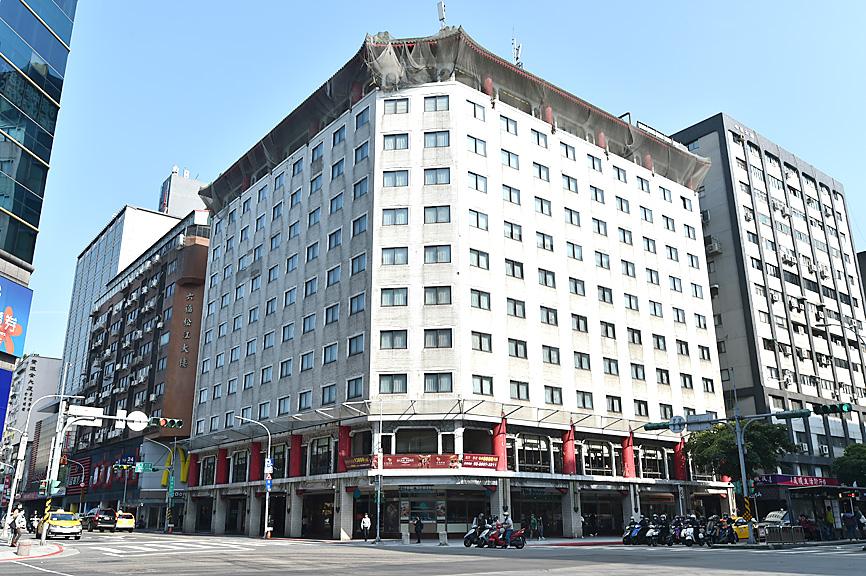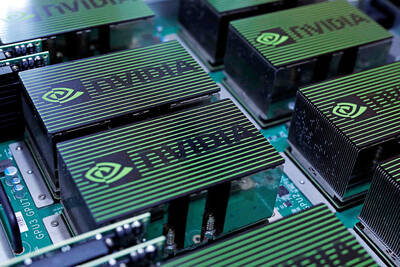Leofoo Tourism Group (六福旅遊集團) on Monday announced a partnership with construction company Taiwan Kumagai Co (華熊營造) to turn its Leofoo Hotel (六福客棧) into an upscale serviced office building.
Construction on the complex in Taipei’s Zhongshan District (中山) is expected to start in the second quarter of next year and finish in 2026, Leofoo said in a statement.
The partnership would allow the company to benefit from Taiwan Kumagai’s experience in developing Taipei 101 in the prime Xinyi District (信義) and the Shin Kong Life Tower (新光摩天大樓) across from the Taipei Railway Station, Leofoo vice chairman Lai Zhen-rong (賴振融) said.

Photo: Tu Chien-jung, Taipei Times
The new office building would have 6,350 ping (20,992m2) of floor space, with 21 floors above ground and six basement levels, Lai said, adding that the building would embrace the latest technology and obtain environmental sustainability certification.
Office buildings are in great demand in central business districts, whereas urban hotels are taking a hard hit from the COVID-19 pandemic, driving the group to halt operations at the nearly 50-year-old Leofoo Hotel last year.
The group, which also operates the Courtyard by Marriott Taipei (六福萬怡) in the city’s Nangang District (南港) as well as the Leofoo Resort (六福莊) and Leofoo Village Theme Park (六福村) in Hsinchu County, said that the project would cost NT$1.92 billion (US$69.35 million).

Leading Taiwanese bicycle brands Giant Manufacturing Co (巨大機械) and Merida Industry Co (美利達工業) on Sunday said that they have adopted measures to mitigate the impact of the tariff policies of US President Donald Trump’s administration. The US announced at the beginning of this month that it would impose a 20 percent tariff on imported goods made in Taiwan, effective on Thursday last week. The tariff would be added to other pre-existing most-favored-nation duties and industry-specific trade remedy levy, which would bring the overall tariff on Taiwan-made bicycles to between 25.5 percent and 31 percent. However, Giant did not seem too perturbed by the

AI SERVER DEMAND: ‘Overall industry demand continues to outpace supply and we are expanding capacity to meet it,’ the company’s chief executive officer said Hon Hai Precision Industry Co (鴻海精密) yesterday reported that net profit last quarter rose 27 percent from the same quarter last year on the back of demand for cloud services and high-performance computing products. Net profit surged to NT$44.36 billion (US$1.48 billion) from NT$35.04 billion a year earlier. On a quarterly basis, net profit grew 5 percent from NT$42.1 billion. Earnings per share expanded to NT$3.19 from NT$2.53 a year earlier and NT$3.03 in the first quarter. However, a sharp appreciation of the New Taiwan dollar since early May has weighed on the company’s performance, Hon Hai chief financial officer David Huang (黃德才)

NVIDIA FACTOR: Shipments of AI servers powered by GB300 chips would undergo pilot runs this quarter, with small shipments possibly starting next quarter, it said Quanta Computer Inc (廣達), which supplies artificial intelligence (AI) servers powered by Nvidia Corp chips, yesterday said that AI servers are on track to account for 70 percent of its total server revenue this year, thanks to improved yield rates and a better learning curve for Nvidia’s GB300 chip-based servers. AI servers accounted for more than 60 percent of its total server revenue in the first half of this year, Quanta chief financial officer Elton Yang (楊俊烈) told an online conference. The company’s latest production learning curve of the AI servers powered by Nvidia’s GB200 chips has improved after overcoming key component

UNPRECEDENTED DEAL: The arrangement which also includes AMD risks invalidating the national security rationale for US export controls, an expert said Nvidia Corp and Advanced Micro Devices Inc (AMD) have agreed to pay 15 percent of their revenue from Chinese artificial intelligence (AI) chip sales to the US government in a deal to secure export licenses, an unusual arrangement that might unnerve both US companies and Beijing. Nvidia plans to share 15 percent of the revenue from sales of its H20 AI accelerator in China, a person familiar with the matter said. AMD is to deliver the same share from MI308 revenue, the person added, asking for anonymity to discuss internal deliberations. The arrangement reflects US President Donald Trump’s consistent effort to engineer